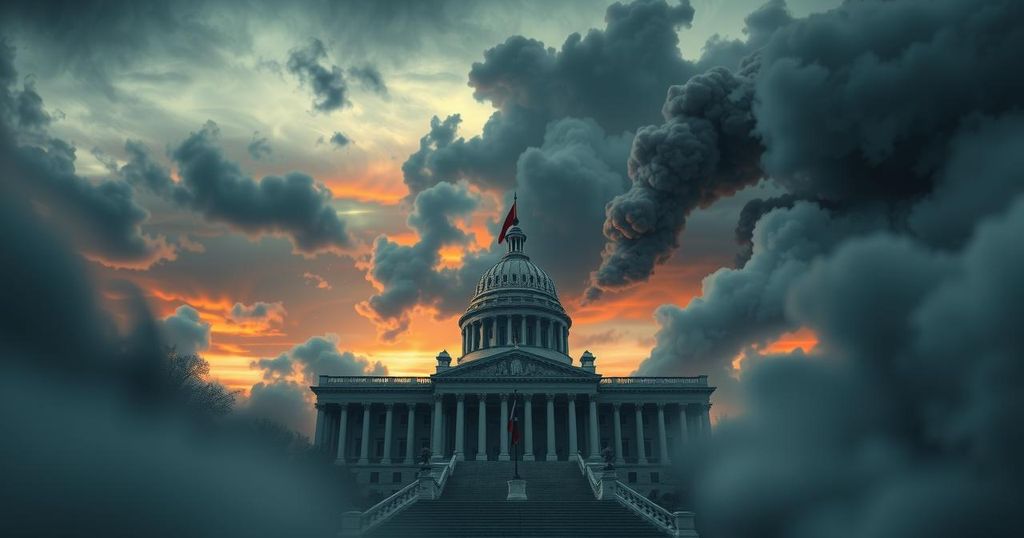Colombia’s President Petro Enforces Emergency Powers Amid Catatumbo Violence
Colombia’s President Gustavo Petro has mandated emergency powers in response to escalating violence in the Catatumbo region, which has led to over 32,000 displacements and at least 80 deaths. The decree is intended to establish order amidst confrontations between rival armed groups. Rights organizations and the UN have called for measures to protect civilians as the humanitarian crisis deepens, with many fleeing to neighboring areas.
Colombia’s President Gustavo Petro has declared a state of emergency to combat rampant violence in the Catatumbo region, which borders Venezuela. The decree, issued on Friday, provides the president up to 270 days to implement curfews, control traffic, and take other necessary actions that might typically violate civil rights or require legislative approval. Rights groups indicate that violence from armed groups has displaced over 32,000 individuals, with at least 80 fatalities reported in recent weeks.
The Catatumbo area has experienced escalating violence, primarily between the National Liberation Army (ELN) and dissident factions from the Revolutionary Armed Forces of Colombia (FARC), over drug trafficking control. In response to this surge, President Petro’s government had to halt peace negotiations with the ELN aimed at fostering stability in the region. Despite his ongoing attempts to achieve “total peace,” difficulties persist due to rivalry among armed groups and continued clashes with Colombian military forces.
To counteract violence, the Colombian government has deployed thousands of troops to the Catatumbo region. Additionally, there have been renewed efforts to pursue ELN leaders with active arrest warrants. The ELN maintains its operations are targeted solely against specific factions rather than civilians. Following the 2016 peace agreement that fragmented FARC, numerous splinter groups have emerged, while scattered peace talks continue between these factions and the Petro administration.
Human rights organizations and international bodies, including the United Nations, have raised alarms over the welfare of civilians amidst the escalating conflict. Statements have been made to urge protective measures for those living in the Catatumbo region, particularly human rights defenders. Amnesty International voiced their concerns, emphasizing the urgent need to shield civilians from the escalating violence and potential human rights violations.
Additionally, many residents are fleeing their homes amidst the turmoil, often seeking refuge in neighboring Venezuela or within Colombia itself. Displaced individuals, including families with children, are reportedly arriving in adjacent regions without adequate resources or assurance of safety. These humanitarian circumstances have raised alarms regarding public health risks and the overwhelming pressure on local support systems. Individuals like Zilenia Pana have expressed deep anguish over the loss and sorrow stemming from the violence, underlining a universal desire for peace and return home.
The article narrates the alarming situation in the Catatumbo region of Colombia, where violence between armed groups is displacing thousands of residents. President Gustavo Petro’s decision to declare a state of emergency represents an escalation in governmental attempts to address deteriorating security conditions. The ongoing conflict involves factions seeking control over lucrative drug trafficking routes, leading to increased violence and human suffering. Amidst the political landscape shaped by past peace negotiations with the FARC and chaos engendered by ELN actions, the plight of civilians remains a pressing concern.
In summary, Colombia is witnessing a series of grave humanitarian crises due to intensified violence in the Catatumbo region. President Petro’s emergency decree reflects an urgent response to protect civilians amid ongoing clashes between armed groups. The situation has prompted significant displacement, humanitarian peril, and international calls for intervention. The plight of affected families and the deteriorating security landscape underscore the complexity of achieving lasting peace in the region.
Original Source: www.aljazeera.com








Post Comment